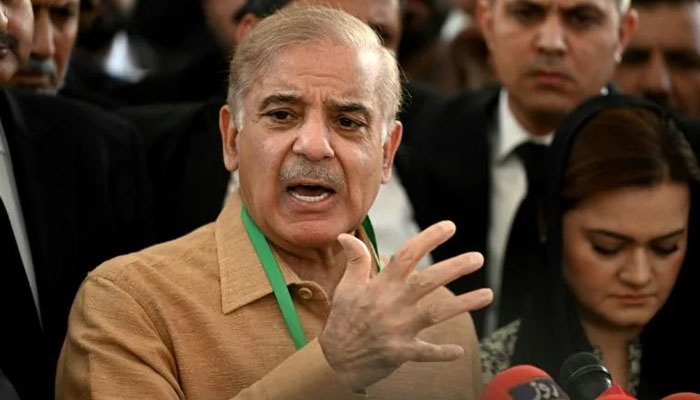‘Pakistan’s next PM’: ‘Punjab Speed’ Shehbaz is a ‘can-do’ person, say foreign media
ISLAMABAD: Shehbaz Sharif, the person most likely to be Pakistan’s next prime minister, is little known outside his home country but has a reputation domestically as an effective administrator more than as a politician, foreign media reported.
The younger brother of three-time prime minister Nawaz Sharif, Shehbaz, 70, is leading a bid by the opposition in parliament to topple Imran Khan, and if a vote of no-confidence goes ahead on Saturday, he is widely expected to replace Khan.
Analysts say Shehbaz enjoys amicable relations with the establishment.
Shehbaz Sharif is best known for his direct, “can-do” administrative style, which was on display when, as chief minister of Punjab province, he worked closely with China on Beijing-funded projects.
He also said in an interview last week that good relations with the United States were critical for Pakistan for better or for worse, in stark contrast to Khan’s recently antagonistic relationship with Washington.
There are still several procedural steps before Sharif can become Pakistan’s 23rd prime minister.If he does take on the role, he faces immediate challenges, not least Pakistan’s crumbling economy, which has been hit by high inflation, a tumbling local currency and rapidly declining foreign exchange reserves.
Analysts also say Shehbaz Sharif will have to work on a collective agenda with the other opposition parties and his elder brother, Nawaz Sharif.
As chief minister of Punjab, Pakistan’s most populous province, Shehbaz Sharif planned and executed a number of ambitious infrastructure mega-projects, including Pakistan’s first modern mass transport system in Lahore.
According to local media, the outgoing Chinese consul general wrote to Sharif last year praising his “Punjab Speed” execution of projects under the huge China-Pakistan Economic Corridor (CPEC) initiative.
The diplomat also said Sharif and his party would be friends of China in government or in opposition.
He entered politics in Punjab, becoming its chief minister for the first time in 1997 before he was caught up in national political upheaval and imprisoned following a military coup. He was then sent into exile in Saudi Arabia in 2000.
Shehbaz returned from exile in 2007 to resume his political career, again in Punjab.He entered the national political scene when he became the chief of the Pakistan Muslim League-Nawaz (PMLN) party after Nawaz was found guilty in 2017 on charges of concealing assets related to the Panama Papers revelations. The Sharif family and supporters say the cases were politically motivated.
Both brothers have faced numerous corruption cases in the National Accountability Bureau, including under Imran Khan’s premiership, but Shehbaz has not been found guilty on any charges.
-
 Jonathan Majors Set To Make Explosive Comeback To Acting After 2023 Conviction
Jonathan Majors Set To Make Explosive Comeback To Acting After 2023 Conviction -
 Next James Bond: Why Jacob Elordi May Never Get 007 Role?
Next James Bond: Why Jacob Elordi May Never Get 007 Role? -
 Maddox Drops Pitt From Surname In Credits Of Angelina Jolie’s New Film 'Couture' Despite Truce From Father's End In Legal Battle
Maddox Drops Pitt From Surname In Credits Of Angelina Jolie’s New Film 'Couture' Despite Truce From Father's End In Legal Battle -
 Burger King Launches AI Chatbot To Track Employee Politeness
Burger King Launches AI Chatbot To Track Employee Politeness -
 Andrew’s Woes Amid King Charles’ Cancer Battle Triggers Harry Into Action For ‘stiff Upper Lip’ Type Dad
Andrew’s Woes Amid King Charles’ Cancer Battle Triggers Harry Into Action For ‘stiff Upper Lip’ Type Dad -
 Experts Warn Andrew’s Legal Troubles In UK Could Be Far From Over
Experts Warn Andrew’s Legal Troubles In UK Could Be Far From Over -
 Teyana Taylor Reflects On Dreams Turning Into Reality Amid Major Score
Teyana Taylor Reflects On Dreams Turning Into Reality Amid Major Score -
 Jennifer Garner Drops Parenting Truth Bomb On Teens With Kylie Kelce: 'They're Amazing'
Jennifer Garner Drops Parenting Truth Bomb On Teens With Kylie Kelce: 'They're Amazing' -
 AI Is Creating More Security Problems Than It Solves, Report Warns
AI Is Creating More Security Problems Than It Solves, Report Warns -
 'Game Of Thrones' Prequel 'A Knight Of The Seven Kingdoms' New Ratings Mark Huge Milestone
'Game Of Thrones' Prequel 'A Knight Of The Seven Kingdoms' New Ratings Mark Huge Milestone -
 Apple Seeks To Dismiss Fraud Suit Over Siri AI, Epic Injunction
Apple Seeks To Dismiss Fraud Suit Over Siri AI, Epic Injunction -
 Delroy Lindo Explains The Crucial Role Of Musical Arts In Setting Up His Career Trajectory
Delroy Lindo Explains The Crucial Role Of Musical Arts In Setting Up His Career Trajectory -
 Timothée Chalamet Reveals How He Manages To Choose The Best Roles For Himself
Timothée Chalamet Reveals How He Manages To Choose The Best Roles For Himself -
 Princesses Beatrice, Eugenie’s Conflict Gets Exposed As Mom Fergie Takes Over The Media
Princesses Beatrice, Eugenie’s Conflict Gets Exposed As Mom Fergie Takes Over The Media -
 Kate Middleton Plays Rock-paper-scissors In The Rain
Kate Middleton Plays Rock-paper-scissors In The Rain -
 Lindsay Lohan On 'confusing' Teen Fame After 'Mean Girls': 'I Should Have Listened To My Mom And Dad'
Lindsay Lohan On 'confusing' Teen Fame After 'Mean Girls': 'I Should Have Listened To My Mom And Dad'




